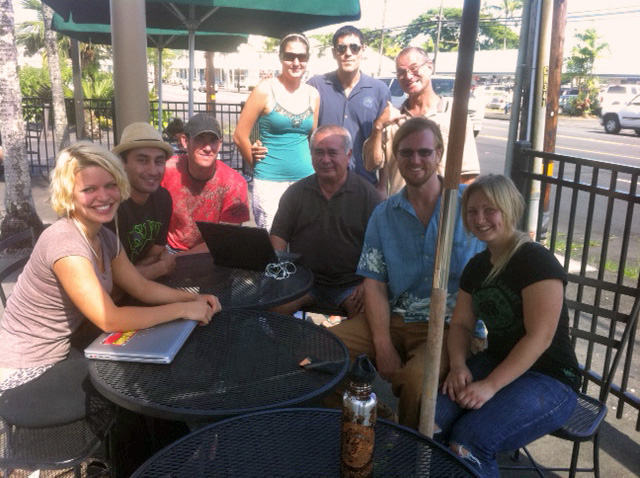Last week I got a call to meet with a group of young folks at Starbucks. They are very aware of the effects of world population growth running into finite resources. They appealed to me saying they want to help move Hawai‘i off fossil fuels and onto indigenous resources. And they want to move now, not tomorrow!
They told me that their generation has no hope in Hawai‘i. They said they have no hope of ever owning their own homes. Jobs are hard to come by. Even if one graduates from college, what then? They understand the connection of oil prices to recession and expansion. They know that it is the cost of energy that is affecting our economy.
This meeting really hit me hard. I was talking to people who are actually being affected by the consequences of finite resources. Yet they are absolutely determined to help make a better future for future generations. They are about more than just me; they are about all of us. I am so hopeful for the next generation.
Reflecting on what they told me, I thought about Law Professor and current U.S. Senate Candidate Elizabeth Warren. Watch this clip, about which the Washington Monthly says: “First-time candidates don’t usually articulate a progressive economical message quite this well.”
A quote from the clip:
“You built a factory out there? Good for you. But I want to be clear: you moved your goods to market on the roads the rest of us paid for; you hired workers the rest of us paid to educate; you were safe in your factory because of police forces and fire forces that the rest of us paid for. You didn’t have to worry that marauding bands would come and seize everything at your factory, and hire someone to protect against this, because of the work the rest of us did.
“Now look, you built a factory and it turned into something terrific, or a great idea? God bless. Keep a big hunk of it. But part of the underlying social contract is you take a hunk of that and pay forward for the next kid who comes along.”
Two years ago, I wrote about and linked to another speech she gave. It, too, is really worth a listen. She talks about how much has changed in just the one generation from the 1970s to the 2000s. We went from families having one person as the breadwinner to two people being the breadwinner, yet didn’t gain any ground.
Some of her points: In the 1970s, a married couple with two kids had one parent in the workforce and saved 11 percent of their income. To get into the middle class, their kids needed to get a high school diploma and to be willing to work hard. That 12 years of education that their children needed, to get into the middle class, was free.
Warren says that the most important thing that happened in the first two-thirds of the 20th century was that women entered the work force.
From my blog back then:
In the 2000s, a similar married couple with two kids must have two people in the work force – because, she says using numbers adjusted for inflation, median mortgage payments in 2005 are 76 percent higher than they were in 1970. Health insurance – in a healthy family with employee-sponsored health insurance – costs the family 74 percent more. Childcare costs have increased 100 percent, and as compared to the 1970s family a 2000s family has the expense of a second car because of that second person in the workforce, and because of that second income their tax rate is up by 25 percent.
In comparable dollars, the 2005 family is actually spending much less on clothes, food, appliances and cars than the 1970s family did; it’s the non-flexible, big ticket and important expenses that have increased so dramatically and that require that second income.
So a comparable married couple with two kids in 2005 has no savings (compared to the 1970s couple, who saved 11 percent of their earnings), and 15 percent of their income is in credit card debt as they try to keep up.
To launch their kids into the middle class requires 16 years of schooling, and the 2005 family has to pay for the first two years (preschool) and the last four years (college) themselves.
So much happened in just one generation, 30 years, and we didn’t even notice it. And change is coming even quicker today. What’s happening in the world now makes me think that Elizabeth Warren’s 30 years is being compressed into 10 years or less now. We can see it all around us.
We are already in the middle of it, and many folks are so busy running on the treadmill that they don’t notice it. We do not have the time luxury of acting on wrong information.
That is why I am encouraging folks in important decision-making positions to attend the Association for the Study of Peak Oil conference. Its theme is Truth in Energy.
I am so happy that young people see it and want to do something about it.
They told me: “Not, no can. CAN!”


Very nice, Richard! They are lucky to meet with you and feel your positive energy. Here in Michigan City, a great group organized by Sierra Club’s Virginia Shannon is working to move us Beyond Coal. While we all face challenges, it is great to see young leadership to help ‘us old guys’. Not no can, Can!
http://www.foodsecurity.org/funding.html
Have you heard of this funding source? I am helping a group in Gary, Indiana apply for this. They have formed Stewart House Urban Farm and Gardens, to produce local food.